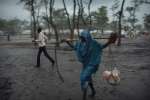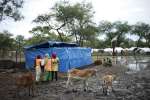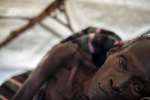- Text size
 |
|  |
|  |
| 
- Français
Uganda: UNHCR working to contain spread of measles among South Sudanese refugees
Briefing Notes, 24 January 2014
This is a summary of what was said by UNHCR spokesperson Adrian Edwards – to whom quoted text may be attributed – at the press briefing, on 24 January 2014, at the Palais des Nations in Geneva.
Today, UNHCR is starting a mass immunization campaign in northern Uganda to prevent the spread of measles among South Sudanese refugees. The Ugandan Ministry of Health has confirmed an outbreak of measles among the more than 59,000 South Sudanese refugees who have arrived in the country since clashes began in South Sudan in mid-December.
Five cases have been registered so far and three suspected cases have been reported among refugees in the Arua area. Samples have been sent to the Uganda Virus Research Institute.
The immunization campaign will cover all refugee and Ugandan children below 15 years in age in the Arua and Adjumani districts. We are working on this project with UNICEF, the Ugandan Ministry of Health, Medecins Sans Frontieres-France, and Medical Teams International.
After the mass immunization campaign, all refugee children arriving in the Adjumani, Arua and Kiryandongo areas, will be systematically screened to ensure they are protected.
We are still receiving 250 refugees a day at the reception area in Adjumani. Recent arrivals are visibly weaker and coming with much less luggage, suggesting they are coming from more distant areas of South Sudan. We continue to hear reports from inside South Sudan of people readying to cross into Uganda, depending on the situation.
UNHCR welcomes the signing of the South Sudan ceasefire agreement and hopes it will be implemented to avert further displacement within and outside of the country.
In the meantime, we continue to provide assistance to the South Sudanese already in exile. In Uganda, we are relocating refugees from the overcrowded transit centres to the nearby settlement of Nyumanzi. Additional sites have been identified, including a former settlement, called Baratuku with little or no infrastructure in place. We are working to install key facilities including water points, health services and schools.
In Ethiopia, on Thursday, we relocated the first group of 500 refugees from the border to the newly set up Leitchor camp in the western region of Gambella. Refugees are being placed in communal shelters and provided with hot meals for two days pending the establishment of family shelters. Once in their own shelters, they will be provided with food rations for one month and kitchen sets so that they can prepare their own food.
Meanwhile, inside South Sudan, people are reported to have moved to border areas from where they might cross into Ethiopia if the situation further deteriorates. Some sources indicated as many as 2,000 people may be pre-emptively heading towards Ethiopia from Maban County in the Upper Nile State.
In Sudan the estimated 17,000 refugees are concentrated in the South and Western Kordofan regions as well in the White Nile region. The latter has seen a significant increase in new arrivals since 16 January as a result of intense fighting in and around Malakal in Upper Nile State. Unconfirmed reports also suggest some 1,200 people might have crossed to the Blue Nile area where we have limited access.
Authorities in the White Nile state have identified two locations- Alagaya in El Jebelein locality and Kilo10 in Al Salam locality – for the establishment of camps. UNHCR and partners are working to urgently develop key infrastructure in the two sites, including water and sanitation facilities as well as health care and schools.
Since mid-December, more than 100,000 South Sudanese have fled to neighbouring Uganda, Ethiopia, Kenya and Sudan.
Inside South Sudan, some 490,000 people are at present internally displaced. In addition, South Sudan is host to 230,000 refugees, most of whom are from Sudan.
For more information on this topic, please contact:
- In Uganda (on mission): Kitty McKinsey (Regional) on mobile +254 735 337 608
- In Juba (on mission): Kisut Gebreegziabher on mobile. +211 928 067 699
- In Mbarara: Lucy Beck on mobile +256 77 271 013
- In Geneva: Adrian Edwards on mobile +41 79 557 9120
- In Geneva: Fatoumata Lejeune on mobile +41 79 249 34 83























































